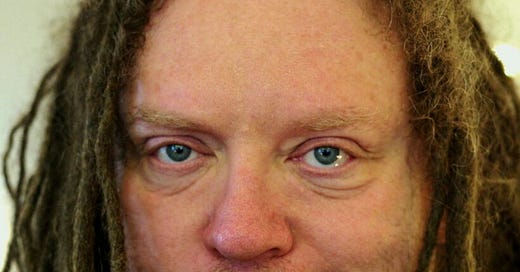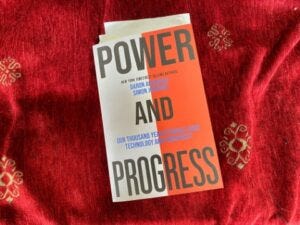Wednesday 10 May, 2023
Jaron Lanier
Photographed after I’d interviewed him in 2013. He’s a lovely, clever, decent human being.
Quote of the Day
”Our American professors like their literature clear and cold and pure and very dead.”
Sinclair Lewis in his Nobel Prize address, 12 December, 1930.
Did you know that he was the first American to win the Nobel Prize for literature? I didn’t.
Musical alternative to the morning’s radio news
Liam O’Flynn and Paddy Moloney | Dueling Chanters
Two great Uileann pipers, now sadly no longer with us.
Long Read of the Day
The dark underbelly… or perhaps the dark floorpan?
My column in last Sunday’s Observer on the downsides of EVs sparked a good many emails from annoyed EV-owners. But it also provoked my friend Quentin into writing a thoughtful commentary on the question.
Electric vehicles have a greater carbon footprint in their manufacturing process than fossil-burners, and it takes a while for the environmental benefits after you drive it off the forecourt to make up for this. In countries like the UK, where it’s relatively easy to get your electricity from renewable or nuclear sources, that’ll probably take about 6-12 months. In countries like the US where you’re probably getting a lot more of your ‘fuel’ from coal, it could take several years, and it’ll probably be the second or third owners of an EV who really have a more carbon-neutral vehicle!
In the intervening period, though, we can feel a little bit more virtuous because — and I do appreciate that any pro-EV points I make in this post might definitely be classified as self-justification! — at least we have moved a lot of pollution away from highly populated areas. (This is distinct from carbon footprint, which can happen anywhere and has a much greater area of impact.) When it comes to human health, though, we’re only starting to get to grips with, for example, the damaging effects of the tiny particulates emitted from exhaust pipes — Tim Smedley’s book Clearing the Air is an excellent explanation — and the key thing about them is that they don’t travel very far. You are more at risk in a cycle lane next to traffic than are the pedestrians a few meters away… especially if they walk on the further side of the pavement.
I’m often annoyed by people who sit stationary with the engine running, while waiting for their kids to come out of school or their spouse to come out of the supermarket… and then I have to remember that the poor things are in such primitive vehicles that they can’t even keep themselves warm in their cars without polluting the local area…
Read on. Quentin had an EV long before I had.
King Charles’s Absurd, Awe-Inspiring Coronation
If you missed the Coronation on Saturday, then Helen Lewis’s account provides ample compensation. Among other things, she wants to know where does Britain keep all these horses and bishops the rest of the time. Me too.
Sometimes the scriptwriters of reality are a little too on the nose. The British throne, the centerpiece of today’s coronation of Charles III, not only houses a sacred artifact forcibly removed from its owners—the Stone of Destiny, taken from the Scots by Edward I in 1296—but is covered in schoolboy graffiti. According to one scrawl from 1800, someone named “P. Abbott” once slept in it. The Coronation Chair, as it’s officially known, also has damage from a 1914 bomb attack attributed to militant suffragettes.
It’s almost too much, isn’t it? The British monarchy is at once a symbol of colonialist plunder, a tradition that many Britons profess to love while cheerfully disrespecting, and an institution that has been dented but not defeated by the forces of social change. I bet the chair even creaks in a manner reminiscent of imperial decline. Britain might now seem like a fading power, but we are a world-beating exporter of metaphors about the state of our nation. At one point today, a gold coach drove under an arch that read happy & glorious, in the pouring rain.
That default miserabilism isn’t really fair—if the coronation proved anything, it’s that a great number of people in Britain are incredibly talented, albeit at skills that were last useful in the 18th century. Did you know, for example, that there are such things as “drum horses,” which the riders steer with reins attached to their feet? We’ve also got heraldic trumpeters, master embroiderers, and someone who can fix the suspension on a gold coach. If you need a “unicorn pursuivant” at short notice, Britain has you covered…
It goes on like this. Magical.
Books, etc.
Power and Progress review – why the tech-equals-progress narrative must be challenged
My review of the book from Sunday’s Observer.
Those who cannot remember the past,” wrote the American philosopher George Santayana in 1905, “are condemned to repeat it.” And now, 118 years later, here come two American economists with the same message, only with added salience, for they are addressing a world in which a small number of giant corporations are busy peddling a narrative that says, basically, that what is good for them is also good for the world.
That this narrative is self-serving is obvious, as is its implied message: that they should be allowed to get on with their habits of “creative destruction” (to use Joseph Schumpeter’s famous phrase) without being troubled by regulation. Accordingly, any government that flirts with the idea of reining in corporate power should remember that it would then be standing in the way of “progress”: for it is technology that drives history and anything that obstructs it is doomed to be roadkill.
One of the many useful things about this formidable (560-page) tome is its demolition of the tech narrative’s comforting equation of technology with “progress”…
Do read the whole thing.
My commonplace booklet
Cow Parsley
Apropos yesterday’s photograph, Hugh Taylor (Whom God Preserve) writes to say that “my Leics/Notts childhood taught me that what I now know as cow parsley was actually ‘keck’”.





